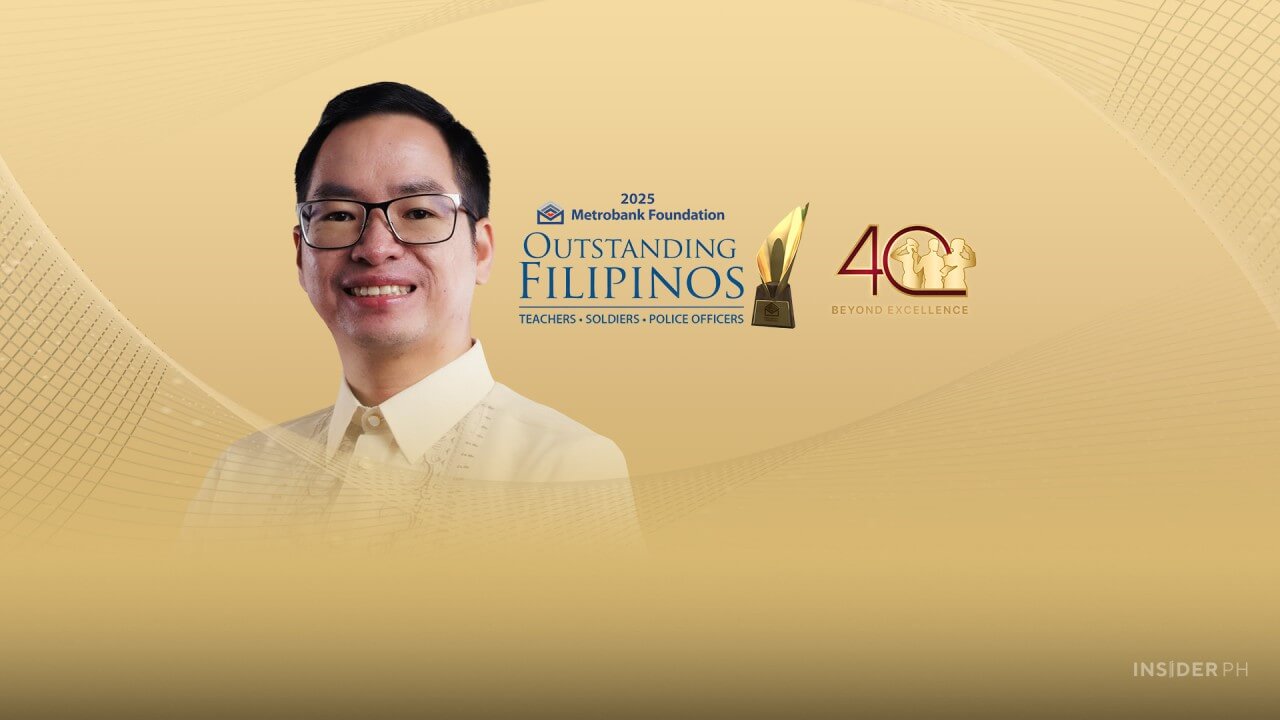

InsiderPH features the inspiring stories of Metrobank Foundation’s awardees as Outstanding Filipinos for 2025—teachers, soldiers and police officers who are making significant contributions to nation building.
He remembers what it was like to learn it with fascination. He remembers Ma’am Rowena, the high school teacher who brought biology to life and made him consider that teaching might be its own kind of science.
A different path
He would eventually abandon the idea of becoming a full-time scientist. He would go on to teach instead. But he never stopped asking the kind of questions that research demands: What do teachers need? What’s missing in science classrooms? What makes a learner believe they are capable?
At 32, Dr. Walag is one of the youngest to hold the rank of Professor VI at the University of Science and Technology of Southern Philippines (USTP).
His office is in Cagayan de Oro, but his work lives in classrooms far beyond it — extending to 14 DepEd Schools Divisions in Northern Mindanao, in alternative learning centers, in public school classrooms where the lack of learning materials makes it a challenge to bring science to life, compelling teachers and students to improvise science kits made of everyday items like plastic bottles.
Career built on interventions
He specializes in science education, but more specifically in pedagogical content knowledge: how science is taught, not just what it teaches. His students aren’t only science majors; they’re future public school teachers, community facilitators, and alternative learning systems (ALS) educators who have to explain mitosis to learners who may not have finished high school themselves.
His is a career built on interventions, on developing programs that respond directly to lived conditions. There’s the Continuing Professional Learning Course (CPLC), which he co-designed for ALS facilitators lacking formal training in science education.
“I train teachers who teach others how to learn,” he says. And in that recursive mission – teacher training teacher – his influence has rippled across the region.
Education by way of empathy
There are also the professional learning communities he initiated, where mentors help peers build confidence and curriculum knowledge.
At iTEC, or the Innovations in Technology for Education Convention, preservice teachers built solutions to the problems they faced in actual classrooms. They learned to ask what was missing and then did something to fill the gap. It was education by way of empathy – anchored not in rote memory, but in real-world frustration and the determination to fix it.
For this, he was recognized with the Philippine Federation of Chemistry Societies (PFCS) Outstanding Achievement in Chemistry Education, an honor that meant little unless the work helped people beyond the walls of the university.
The outputs from iTEC are not abstract. One of his students wrote and produced storybooks on diseases and the immune system. Another created a game on climate change. These weren’t just displayed; they were deployed. “It meant the knowledge moved. It meant it was usable, lived-in,” he says.
Beyond theories
His research follows the same arc. When he studied scientific literacy and teaching confidence, it wasn’t for theory. It was to build training modules for teachers, many of them in underserved schools, who were asked to teach without the tools or belief that they could. His work gave them both. What began as data became programs. The papers turned into workshops. The research became real, and the impact stayed long after the citations.
“Many teachers lack content knowledge,” he says plainly, “but it’s not their fault. They haven’t been supported.” And so he builds opportunities for them.
Dr. Walag is not one to take up space. He’d rather listen first. During his lectures, he often steps back, letting students find their own language for the work.
Colleagues say he’s the kind of mentor who meets you where you are and walks with you quietly, until you don’t realize you’ve reached the next step.
Then, the calls
And yet there’s steel behind the softness. In January 2025, just as he was preparing for an upcoming training, he received two calls that changed everything.
One was about his father, from whom he had long been estranged. The man was gravely ill, and the timing, though unexpected, was final. The second call came days later: his wife had nearly collapsed. It was an ectopic pregnancy. She was rushed into emergency surgery.
For a moment, everything paused. The man who stood at the back of rooms and rarely raised his voice now found himself between two hospital beds, between the unfinished work of reconciliation and the immediate need to hold a life together. He considered walking away from everything. But he didn’t.
The measure of a life
Before this all happened, he received national recognition from PFCS for his research contributions to science education. And yet he remains ambivalent about visibility.
He says he doesn’t want to be remembered for the number of papers he has published, or for the positions he held. He wants to be remembered, if at all, for helping a teacher feel confident enough to teach science to a room full of students who might one day believe they can be scientists themselves.
In a country where the education system so often forgets its most basic promise, Dr. Walag has spent his life remembering. —Metrobank Foundation